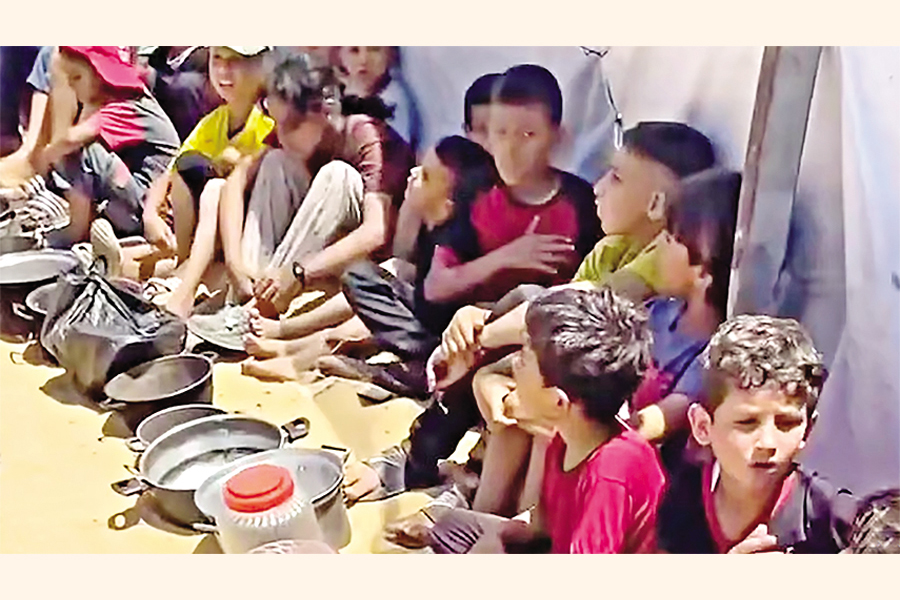
Published :
Updated :

Reports on hunger and food insecurity are unnerving. The 2025 state of food security and nutrition in the world (SOFI) report finds that 673 million people constituting 8.3 per cent of the global population faced acute hunger in 2024. The SOFI is an annual publication by five important United Nations (UN) agencies---the Food and Agriculture Organisation (FAO), International Fund for Agriculture Development (IFAD), United Nations Children's Fund (UNICEF), World Food Programme (WFP) and World Health Organisation (WHO). The same report claims that 2.3 billion global people faced moderate to acute hunger and 2.6 billion could not manage nutritious and healthy diets.
Indeed, there was a sharp rise in the number of global people facing hunger and experiencing food insecurity in the post-pandemic time. In 2021 the number of people suffering chronic hunger was 828 million, which came down to 733 million in 2023. The hunger rate has continued to decline but not as fast as could make up for the lost progress in the past five years. Yet the current ratio of one in 11 people as against one in four 55 years ago is a progress on the global hunger front. If the present trend prevails, 512 million people still are likely to face acute hunger in 2030. The prevalence of hunger is uneven with 60 per cent of the hungry people projected to be living in Africa.
War and internecine feuds have been the main reason behind food insecurity for 140 million people in 20 countries. The Covid-19 pandemic may have triggered the food shortages but its impact has been particularly telling for those countries riven by armed conflicts. Climate change and unpredictable extreme weather have been responsible for food losses and insecurity. Yet the world produces enough food to feed its 8.2 billion people but for the uneven distribution of the same.
Access to food is a human right and if the world cannot ensure availability of healthy food to a large number of its people, the present civilisation ought to stand accused of not living up to its promise. When billions of dollars are spent on weapons of mass destruction and people go hungry in any corner of this planet, the psychological shock should have been monumental for world leaders. Instead of resolving conflicts, they stoke social unrest and even violent hostilities in underdeveloped countries in order to monopolise exploitation of resources there. This is in addition to the plunder of wealth, particularly from Asia and Africa, during the colonial rule.
Like the climate fund the biggie emitters of CO2 in the world are now contributing to as a compensation for spoiling the planet's health, the once colonial power have been making some amend in the form of aid or donation for their act of mindless exploitation of the colonies under them. Now the development aid has already shrunk and likely to shrink further in the days to come. A study by the Barcelona Institute for Global Health (ISGlobal) paints a grim picture of the impact of abrupt cuts to such aid by the major donor countries. The United States of America, Britain, Germany have tight-fisted to reduce their development aid for the first time in three decades. The ISGlobal's projection is that the aid cuts would be responsible for 22.6 million additional deaths in developing countries by 2030. Of those, 5.4 million will be child deaths. In its 2026 Global Outlook, the WFP claims that 318 million people may face 'crisis level hunger or worse' in 2026.
This is an indication that the 'Zero Hunger', one of the sustainable development goals (SDGs) will remain out of reach by 2030. The predicament of both displaced people such as the Rohingya on account of political unrest and conflicts and the climate refugees will be worse on account of the slashing of the overseas development assistance (ODA) by the rich nations in the West.
Then why are the donors reducing their assistance? Their economies are not performing particularly well. The rise of Asia, including some South-east Asian countries and China and India in particular has made the Western powers nervous. A cold war-like political atmosphere is now vitiating relations between and among the major players of the world. US President Trump has made the European powers to finance their security requirements, curtailing their overwhelming dependence on America. Here is an American president who betrays method in madness has, in the name of US interests, antagonised both allies and enemies. Rich and developed countries have been compelled to dig deep into their reserves.
The humanitarian cause of feeding the hungry has been relegated to the back burner. Trump's inconsistent reciprocal tariffs have had adverse impacts on the global economy in general. He penalises some for following policies that clash with American interests but exonerates others for the 'same offence'. Unpredictability of his trade policies has caused unprecedented disruptions to international commerce and trade. The international programmes of feeding the world's hungry and taking care of the health and hygiene in countries not capable of addressing such critical issues themselves are no longer a priority.
With the climate change wreaking havoc and the artificial intelligence (AI) pushing human employees out of job, more and more people are set to lose their jobs. The digital divide has only turned people more selfish and devoid of compassion. Nations are out to build their defence mechanism in terms of lethal weapon system and economy. Unless the fresh race for economic and defence superiority can be contained, the hapless, poor and hungry will have no chance of survival as healthy and dignified citizens on this planet.
nilratanhalder2000@yahoo.com


 For all latest news, follow The Financial Express Google News channel.
For all latest news, follow The Financial Express Google News channel.